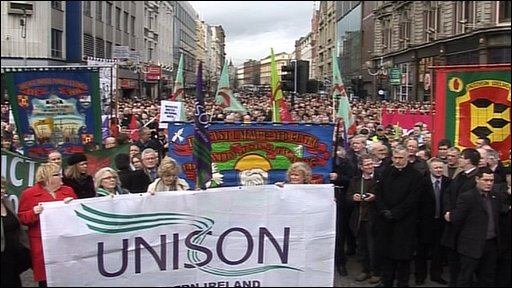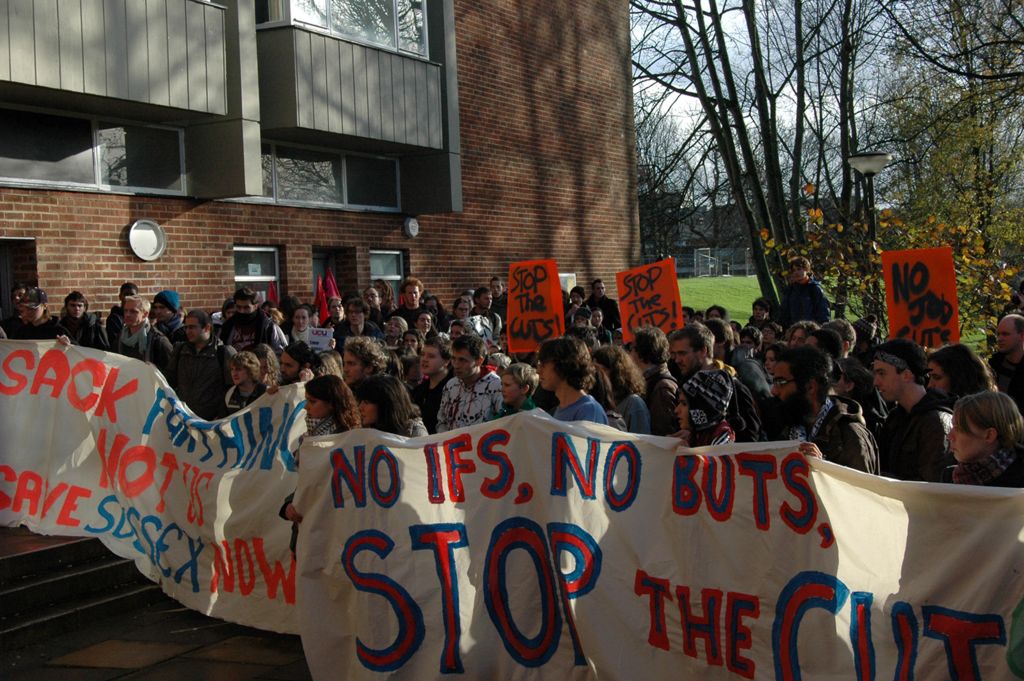The following report was drawn up by the Irish Marxist group, Socialist Democracy
10 November 2010
I Introduction
The Irish State is one of the most globalised in the world and for nearly two decades was held up as a model of economic development across Europe and further afield. Now it is in severe crisis and faces bankruptcy. The Irish Government has applauded its ‘first mover’ advantage in its efforts to enforce austerity – that it was taking the steps that sooner or later all other states would be forced to take. The small and weak character of the Irish State means that it often exaggerates trends that exist elsewhere. For all these reasons the Irish experience is an important one for others to study.

Continue reading “Ireland country report”
IMF Will Entrench the Economics of the Madhouse
The following article is by the Irish socialist-republican group, éirígí
20/11/10
ICTU Protest, Saturday November 27th, 12pm, Wood Quay, Dublin Budget Night Protest, March to Leinster House. Assemble 5.30pm, Tues December 7th, Wolfe Tone Monument, Stephen’s Green, Dublin Introducing the catastrophic €400 billion [£340 billion] blanket bank guarantee scheme in September 2008, Twenty-Six County finance minister Brian Lenihan was keen to offer reassurance to those genuinely fearful of the consequences of such economic recklessness.

Continue reading “IMF Will Entrench the Economics of the Madhouse”
Sussex University occupation
Mike Kay
On 8 February, over 100 students at Sussex University in South East England marched up to the top floor of the university’s prestigious Bramber House conference centre and staged a “‘flash occupation”. They marched out 30 hours later, promising more actions to come in the future.
The occupation was part of the Defend Sussex Campaign, an ongoing fight by students and staff at Sussex against savage cuts that the university is planning. The cuts amount to £3 million this academic year, and £5 million next year, meaning course closures, job losses and fee increases.
However at the same time as proposing these cuts, the university administration is planning to spend £112 million on new buildings and refurbishments on campus, as well as raising the salaries of the top 14 managers to a combined £2.1 million per year. Continue reading “Sussex University occupation”
Abolish GST
At present John Key and National are floating the idea of raising GST

(goods and services tax) from 12.5% to 15 percent, while lowering income tax for all and also reducing company taxes. Key and his pals present this approach – lowering direct taxation and increasing the tax on consumption – in a populist way, as if it would benefit workers. Key has added that the Working for Families package could be increased, along with some other measures, to help offset any losses for lower-waged workers and the minimum wage has been increased (minimally) by 25c an hour. Once again, there is nothing for beneficiaries.
The first thing to note about GST is how it affects people on lower incomes the most. Continue reading “Abolish GST”
POVERTY WAGES – THE CHALLENGE OF HISTORY
Don Franks
The 25 cent government increase in the minimum wage from 1st April was denounced by union leaders as “a cheap shot’ and “mean.”
The increase to $12.75 from April 1st, 2010 is an annual increase of only two per cent. The NZ Institute of Economic Research inflation forecast is 2.3 per cent for the year to March 2010 and the average wage rose 2.8 per cent in the six months to September 2009 alone. That suggests the lowest paid workers are going to be relatively worse off than they are already. Continue reading “POVERTY WAGES – THE CHALLENGE OF HISTORY”
Bad banks or bad capitalism?
The Spark November 2009 Philip Ferguson
One of the issues that has arisen with the current recession is the responsibility of banks for the partial meltdown in the financial sphere. Sections of both the left and the right had traditionally targeted banks, a practice that has become more pronounced with the new recession. For instance, on January 19 this year the Financial Times in Britain even ran a headline saying “Shoot the bankers, nationalise the banks.” In New Zealand, Federated Farmers has accused banks of “profit-gauging” – rather rich when you consider the amount of profit made by Fonterra! Traditionally, in New Zealand, right-wing nationalists such as Social Credit targeted the banks, a reaction to the fact that the social base of that movement – small farmers and small businessmen – were often squeezed by banks in terms of credit, mortgages, loans and so on. Continue reading “Bad banks or bad capitalism?”
Recession and Redundancy
The Spark October 2009
John Edmundson
As the recession has bitten, redundancies have risen and unemployment figures have begun to climb, Labour’s Darien Fenton has had her Private Member’s Bill drawn from the ballot. The Bill would enforce a minimum redundancy payout on all employers, starting at four weeks pay after one year of employment. The Labour Party of course is the party that introduced the Employment Relations Act, which does not even provide a definition of the word redundancy, let alone provide significant protection for workers. New Zealand workers actually have no legal right to redundancy compensation and very few have provision for it in their contracts.
Workers at LWR’s Wairarapa sites who were made redundant earlier this year have been told that they are unlikely to receive any more than seventy percent of their entitlement in redundancy and holiday pay. Approximately eighty percent of staff with written employment agreements (contracts) have no redundancy provisions at all according to a Massey University survey commissioned for the Department of Labour’s Restructuring and Redundancy Public Advisory Group. Continue reading “Recession and Redundancy”
The state of the working class
The Spark October 2009
Philip Ferguson
The recession has been officially declared over, thanks to 0.1% economic growth in the last quarter. The government and various economic experts agree, however, that more jobs will be lost over the next year to 18 months.
In The Spark, we’ve consistently argued that the current global recession is nothing like on a par with the Great Depression of the 1930s nor is it the worst global downturn since then. Current trends suggest we made the right call, while many on the left vastly overplayed the degree of economic crisis. However, we’ve also pointed out that it is equally important to remember that this is actually about as good as it gets under capitalism these days – short mini-booms, often in the artificial economy, followed by recessions, with workers usually ending up worse off after each recovery than they were after the previous recovery. Continue reading “The state of the working class”
National’s McJob Creation Scheme
The Spark August 2009
Byron Clark
The government has made a deal with fast food giant McDonald’s in which young people receiving the unemployment benefit will be sent to jobs in McDonald’s restaurants, and have their ‘training’ subsidised by the state. Every beneficiary McDonald’s hires will get the company up to $16,000 which is the equivalent of about 8 months wages for a McDonalds worker. Social Development and Employment Minister Paula Bennett is citing the relationship with the golden arches as an example of “the Government’s commitment to getting beneficiaries into jobs,” but while the growing number of unemployed certainly need jobs, McDonald’s needs workers a whole lot more, and this is what the scheme is really about.
Fast food is a growth industry during this recession, as people who would have previously eaten at more up-market restaurants lower their budgets. McDonald’s in New Zealand is continuing to build on its profits, enough to open a number of new outlets. They need to employ an estimated 6,000 workers over the next few years. The reason? Those workers are where their profit comes from. The company can provide an investment to build a new store with all the cooking and food preparing equipment that requires, but it can’t see a return on that investment until labour (ie, workers) is added. A McDonald’s worker doing an eight hour shift for minimum wage will be paid $100, but by turning raw materials (buns, meat patties, frozen Happy Meals, that worker could produce $200 for the company. Without the worker, McDonald’s couldn’t realise a profit. Continue reading “National’s McJob Creation Scheme”
Recession scenarios
Philip Ferguson
In the past couple few weeks the Reserve Bank governor Alan Bollard, prime minister John Key, and other commentators have been talking about the recession, or at least the worst of it, being over.
Bollard is a fairly level-headed and reasonably sophisticated bourgeois economist and Key is a fairly level-headed, reasonably sophisticated capitalist political manoeuvrer. So their view of the current state of the recession is worth some consideration and can’t just be dismissed as capitalist propaganda.
The evidence, such as it is, that has been presented to suggest NZ is coming out of recession is pretty flimsy, however. A news item that featured what they were saying on the subject showed a case of one house that had been sold in five days, whereas last year the same house hadn’t sold in months. That is hardly evidence for much at all.
Harcourts’ real estate blue book in early July contained an ‘informational’ sheet in which Harcourts declared the recession, or at least the recession in house prices, over. Their evidence was improved house sales for the past two months. This verdict on their part seemed rather unconvincing – especially since it came in a blue book that was at least 1/3 smaller than the size of the blue books last year. If the housing market was really jumping back up, then the Realtor and the Harcourts blue book wouldn’t be the slimmed down volumes that they are at present.
More importantly, a real recovery couldn’t be judged from house prices. No new value is created in the sale of houses – all that is involved is prices going up and down. If they go up, above the actual value of houses, these boosted prices simply draw money from elsewhere in the economy – and, usually, also involve the extension of more credit. Continue reading “Recession scenarios”
